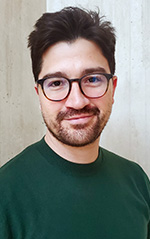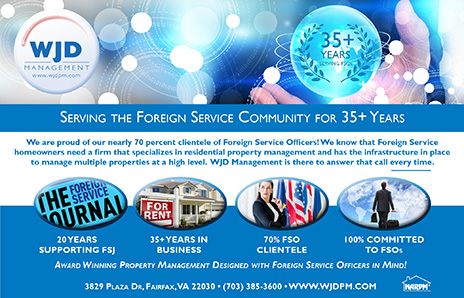Meritocracy at State: Who Deserves What
How do we know who “deserves” to be admitted into the U.S. Foreign Service? An entry-level officer explores the question.
BY MARSHALL SHERRELL
I did not pass the Foreign Service Officer Test (FSOT). Yet I am serving on my first overseas tour as a bright-eyed and bushy-tailed new Foreign Service officer in Israel. I came into this career as a growing number of diplomats at every level had before me: through the fellowship programs. Revered by some and disdained by others, these programs represent the primary “other” way of getting into the Foreign Service.
Fear of being ostracized or marginalized at the workplace has led countless Pickering and Rangel Fellows to go many years into their careers while keeping their status as fellows “in the closet.” The recent restructuring of the Foreign Service’s recruitment process with regard to the FSOT has brought to light a similar controversy.
Although the decision to restructure the testing and recruitment process of the Foreign Service was not made purely for reasons associated with diversity, equity, inclusion, and accountability (DEIA), recent changes in how the FSOT is weighed have drawn ire from some of the old guard who fear that these changes are more political than strategic, and will serve to undermine the fundamental goal of the recruitment process: bringing in the best people for the job. In pursuit of this goal, they say, passing the FSOT is an indispensable first step.
They argue that the selection process for a job as vital as diplomacy needs to rise above quibbling over accessibility and instead focus on weeding out the unqualified to the benefit of our entire country. Putting aside the question of whether the FSOT helps to achieve this objective, I would like to interrogate the efficacy of the so-called meritocratic system we’re dealing with. How do we know who is legitimately qualified to be in the Foreign Service; who “merits” being chosen?
Testing and Recruitment Over Time
Look into the history of the Foreign Service’s testing and recruitment process, and you’ll find that it has changed dramatically over the years. In 1953 the Foreign Service Officer Assessment (FSOA) was an hour-long interview. Were the people who passed that version of the assessment (and are now either our bosses, or retired) less qualified than those who came after? Or perhaps those who passed the longer FSOA are actually more qualified? What about the days-long FSOT testing process that existed in the 1950s, as compared to the three-hour test most of us are familiar with? What of the “mustangs” who transitioned to the Foreign Service from the Civil Service without having to take the FSOT?
The Foreign Service has evolved and adapted its recruitment processes several times over the years. Just as some of those who are reading this might scoff at the notion of trivializing an applicant’s FSOT results, so you can also be sure that the generation before them had their share of scoffers decrying the then-new system they functioned in. It isn’t hard to understand why: It’s human nature to believe that one’s own achievements are more remarkable than the achievements of others. If a system benefits us, we are likely to extol its virtues and to fight to retain that system because it’s a part of our personal success story and therefore linked to our egos.
Whether or not the FSOT can be trusted as objective, it is only one step among many in the hiring process, the majority of which are more subjective. In the Qualifications Evaluation Panel (QEP) review (a step that was only established in 2007), candidates are first evaluated by a computer program, then by human beings who ultimately decide if they are compelled by what you wrote, or not. The FSOA also involves a panel of humans—notoriously biased as a species—evaluating you and your peers’ responses in real time. Even security and suitability clearances can hinge on just how much scrutiny individual investigators might think your past misconduct merits. In short, the recruitment process has never been purely meritocratic.
What can we glean from an applicant’s ability to perform well on a multiple-choice exam such as the FSOT? Certainly not any real knowledge of traits such as cultural adaptability, initiative and leadership, or working with others—some of the 13 dimensions the Foreign Service looks for. If the FSOT assessed candidates’ prospects as well as intended, State wouldn’t have created the QEP at all. Clearly, for all of the work that goes into getting the best people for the job, the recruitment process is still in need of fine-tuning.
Vetting Never Stops
As for who deserves to be here, I certainly don’t know the answer. I can tell you that pathway programs such as the Pickering, Rangel, or Payne Fellowships are extremely competitive. I can tell you that they are open to most of the same applicants who came into the Service via the traditional route. I can tell you that I know FSOs who failed to pass the recruitment process for the fellowships, then found success by going through the traditional recruitment process, and vice versa. But none of that really determines who deserves to be here. That will be determined on the job.
I don’t yet know whether I will ultimately succeed in this career. But in that regard, I’m no different than any other entry-level officer (ELO). If I succeed in this career, or if I fail, I will be in the company of many others who came before me, whether through the new FSOT, the old one, or neither. The vetting process never really stops.
The fact that tenure can only be achieved after ELOs have seen years of real-world experience as FSOs further illustrates this point. The State Department never believed that their own initial testing methods were sufficient to judge a candidate’s potential. Some of you are on, or can remember being on, “language probation,” the prospect of passing your next language evaluation looming as yet another test standing between you and the continued pursuit of your career. Even after tenure, the up-or-out promotion system is an ongoing test FSOs must pass, and then at some point compete for entrance into the Senior Foreign Service.
This emphasis on diversity is not merely to promote a moral imperative of wider inclusion: It’s a strategic decision to better serve the interests of the State Department.
Finding truly qualified candidates and creating truly capable diplomats is an exceedingly difficult task precisely because ours is a life and career for which there is no blueprint. If only it were as simple as passing a multiple-choice test; the department could save untold millions on recruitment, retention, and promotion simply by taking the highest-scoring candidates. Unfortunately, vetting the best candidates and creating the best diplomats are not so simple tasks.
As with all systems of stratification, those who benefited under the FSOT method of culling sometimes tend to advocate for the system that rewarded them. This does not, of course, mean that another system is inferior. I’ve already discussed how the FSOT has changed over the years in pursuit of something better. Unfortunately, change itself is often viewed with suspicion; even early automobiles once drew mockery from those who were used to a horse and carriage. Yet uncomfortable change is essential for development.
With A-100 relatively fresh in my memory, I can recall what one mentor said to my class: “The Foreign Service is aspirational.” That is, the work we do is nearly impossible to quantify, and it is even more difficult to judge its efficacy. It adapts to new developments at home and abroad, looking for opportunities and striving toward new possibilities. At best, our work embodies the projection of hope onto a world that can look hopeless. How would one define the net value of wars that were never fought? Or of criminals turned away at visa lines?
I’m not going to try to define effective diplomacy because I think it’s a loaded term. But I do know that doing the same things the same way produces the same results; and I do know that as an aspirational organization, the State Department will (hopefully) never cease to progress and innovate, even if sometimes at a snail’s pace.
The Importance of Diversity
Part of that laborious innovation involves a push for wider inclusion. Rather than hyper-focusing on standardized tests to produce standardized diplomats, the State Department has increasingly sought a variety of experiences from its applicants (in stark contrast to much of the rest of the world, where careers in diplomacy are still reserved for the well-connected). Where else but America could a 30-something former janitor like me take his hopes and his creative writing degree, and be given a chance to change both his own life and (aspirationally) the wider world through this career?
This emphasis on diversity is not merely to promote a moral imperative of wider inclusion: It’s a strategic decision to better serve the interests of the State Department in navigating through complex problems on the global stage … because two heads are better than one only if they don’t think the same things. This is why phrases like “strength in diversity” are more than inspirational quips.
We have a radically different brand of diplomacy because we are a radically different kind of country. No, our diplomacy is not standard. It’s far from conventional. But convention has never been good enough for the greatest nation on earth. We seek, adapt, innovate, improvise, and lead. In this sense, U.S. diplomacy mirrors U.S. industry. In another sense, diplomacy is also representational; hence, the government doesn’t hire FSOs on H1B visas to take our jobs (although many H1B visa holders would likely outperform us on the FSOT!).
Individual merit and wider representation have always been coexistent factors in FSO selection. The difference today is that the State Department has recently begun to see how much more varied talent is available to them if they remove a few of the rigid fixtures that historically led a very specific “type” into Foreign Service work.
Seeking a wider scope of knowledge and experience led State to recruit former Shakespearean actors, orphans adopted from Kazakhstan (both being among my personal friends and colleagues), and even me. It’s not that Georgetown grads with degrees in Foreign Service are no longer needed, or that either pathway to this career is better than the other. Rather it is precisely because our disparate paths, experiences, and bodies of knowledge add great breadth and depth to U.S. diplomacy.
But suppose that I’m wrong. If the State Department made a mistake in hiring any one of us, they will have ample opportunity to rectify it. Conversely, if we prove our merit in the field, that is the greatest and perhaps only real proof that any of us deserve to be here.
When sharing or linking to FSJ articles online, which we welcome and encourage, please be sure to cite the magazine (The Foreign Service Journal) and the month and year of publication. Please check the permissions page for further details.
Read More...
- “Who is the Total Candidate? FSO Hiring Today” by Shawn Dorman, The Foreign Service Journal, June 2008
- “Toward a Foreign Service Reflecting America” by Lia Miller, The Foreign Service Journal, June 2015
- “Radically Simple Ideas for a Better State: Foreign Service 2.0” by JC Windham, The Foreign Service Journal, November 2018





